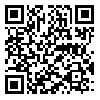Accepted article
Back to the articles list |
Back to browse issues page
Atiyeh Safarzadeh * 

 1, Maryam Bakhtiari2
1, Maryam Bakhtiari2 

 , Mohammad Reza Shaeiri3
, Mohammad Reza Shaeiri3 

 , Zahra Ahmadvand4
, Zahra Ahmadvand4 

 , Ali Kheradmand5
, Ali Kheradmand5 

 , Mohsen Saberihaji6
, Mohsen Saberihaji6 

 , Bonnie Bozorg7
, Bonnie Bozorg7 




 1, Maryam Bakhtiari2
1, Maryam Bakhtiari2 

 , Mohammad Reza Shaeiri3
, Mohammad Reza Shaeiri3 

 , Zahra Ahmadvand4
, Zahra Ahmadvand4 

 , Ali Kheradmand5
, Ali Kheradmand5 

 , Mohsen Saberihaji6
, Mohsen Saberihaji6 

 , Bonnie Bozorg7
, Bonnie Bozorg7 


1- PhD in Clinical Psychology, Shahid Beheshti University of Medical Sciences, Tehran, Iran
2- PhD in Clinical Psychology, Faculty Member, Department of Clinical Psychology, Shahid Beheshti University of Medical Sciences, Tehran, Iran
3- PhD in Psychology, Faculty Member, Department of Psychology, Shahed University, Tehran, Iran
4- PhD Student in Clinical Psychology, Department of Clinical Psychology, School of Behavioral Sciences and Mental Health, Institute of Psychiatry, Iran University of Medical Sciences, Tehran, Iran
5- Assistant Professor of Psychiatry, Department of Psychiatry, Shahid Beheshti University of Medical Sciences, Tehran, Iran
6- Psychiatrist, Faculty Member of Psychiatry Department, Shahid Beheshti University of Medical Sciences, Tehran, Iran
7- Master of Clinical Psychology, Department of Student Mental Health & Counseling Services, Shahid Beheshti University of Medical Sciences, Tehran, Iran
2- PhD in Clinical Psychology, Faculty Member, Department of Clinical Psychology, Shahid Beheshti University of Medical Sciences, Tehran, Iran
3- PhD in Psychology, Faculty Member, Department of Psychology, Shahed University, Tehran, Iran
4- PhD Student in Clinical Psychology, Department of Clinical Psychology, School of Behavioral Sciences and Mental Health, Institute of Psychiatry, Iran University of Medical Sciences, Tehran, Iran
5- Assistant Professor of Psychiatry, Department of Psychiatry, Shahid Beheshti University of Medical Sciences, Tehran, Iran
6- Psychiatrist, Faculty Member of Psychiatry Department, Shahid Beheshti University of Medical Sciences, Tehran, Iran
7- Master of Clinical Psychology, Department of Student Mental Health & Counseling Services, Shahid Beheshti University of Medical Sciences, Tehran, Iran
Abstract: (90 Views)
Objectives: The high prevalence of borderline personality disorder, along with comorbid psychiatric disorders and impulsive reactions (suicide attempts, self-mutilation, substance use, and impulsive behaviors) increase the need for effective psychological interventions. The effectiveness of dialectical behavior skills training based on Soler method and family education with individual therapies were compared in this group of patients.
Methods: In this single-blind case study, eight cases were selected through a targeted sampling method based on inclusion and exclusion criteria. They were included in two groups: intervention individually and individual one with family education. Both of groups’ members and the family members of the second group received dialectical behavior skills training based on the Soler model. Participants completed the Borderline Personality Inventory (BPI), Self-Harm Inventory (SHI), and Barratt Impulsivity Scale (BIS) in four stages: at the beginning of the sessions, in the middle of the treatment, at the end of the treatment, and three months after treatment.
Results: Data were analyzed using the Wilcoxon test, Friedman test, and Mann-Whitney U test. The results indicate the effectiveness of dialectical behavior skills training method based on the Soler model in reducing symptoms of borderline personality disorder and self-mutilation, as well as emotion regulation improvement at a significant level of P = 0.05.
Discussion: This treatment is recommended as an effective and short-term method for controlling symptoms of borderline personality disorder. Family education, in addition to dialectical behavior therapy, has been shown to have a positive effect on reducing symptoms in patients.
Methods: In this single-blind case study, eight cases were selected through a targeted sampling method based on inclusion and exclusion criteria. They were included in two groups: intervention individually and individual one with family education. Both of groups’ members and the family members of the second group received dialectical behavior skills training based on the Soler model. Participants completed the Borderline Personality Inventory (BPI), Self-Harm Inventory (SHI), and Barratt Impulsivity Scale (BIS) in four stages: at the beginning of the sessions, in the middle of the treatment, at the end of the treatment, and three months after treatment.
Results: Data were analyzed using the Wilcoxon test, Friedman test, and Mann-Whitney U test. The results indicate the effectiveness of dialectical behavior skills training method based on the Soler model in reducing symptoms of borderline personality disorder and self-mutilation, as well as emotion regulation improvement at a significant level of P = 0.05.
Discussion: This treatment is recommended as an effective and short-term method for controlling symptoms of borderline personality disorder. Family education, in addition to dialectical behavior therapy, has been shown to have a positive effect on reducing symptoms in patients.
Keywords: Borderline Personality Disorder, Dialectical Behavior Therapy-Skill Training, Family therapy, Personality disorder
Article type: Original Research Articles |
Subject:
Psychology
Received: 2023/01/1 | Accepted: 2023/05/29
Received: 2023/01/1 | Accepted: 2023/05/29
Send email to the article author
| Rights and permissions | |
 |
This work is licensed under a Creative Commons Attribution-NonCommercial 4.0 International License. |



